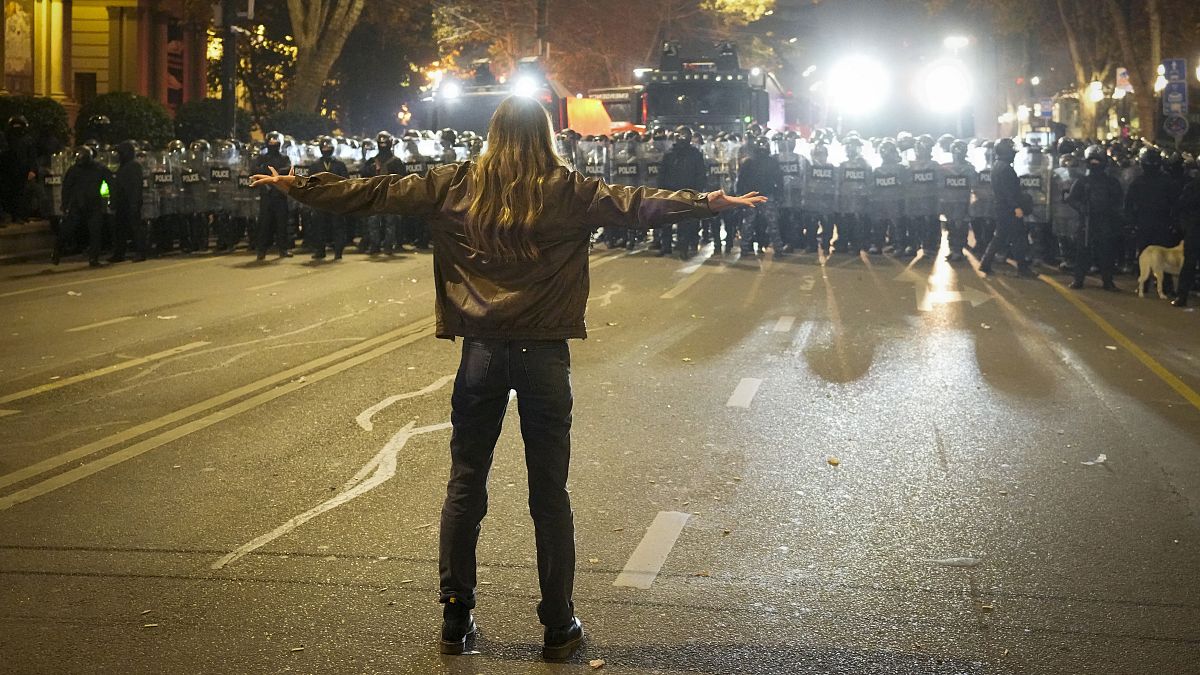The foreign ministers demanded that ‘fundamental rights, including freedom of peaceful assembly and freedom of expression, must be upheld and protected as per Georgia’s constitution’.
The foreign ministers of Germany, France and Poland have condemned “the disproportionate use of force” against pro-EU protesters in Georgia as the wave of unrest continues for a tenth night.
In their joint statement, the three foreign ministers – Annalena Baerbock, Jean-Noël Barrot and Radosław Sikorski – called for the immediate release of opposition members.
More than 400 protesters, including opposition leaders and at least 50 journalists, have been detained, while over 100 people have been treated for injuries.
The ministers demanded that “fundamental rights, including freedom of peaceful assembly and freedom of expression, must be upheld and protected as per Georgia’s constitution and international commitments.”
Germany, France and Poland also called on the ruling Georgian Dream party to deescalate tensions and open an inclusive dialogue with all political forces and representatives of civil society.
“We underscore our determination to support the democratic and European aspirations of the Georgian people,” the statement said.
The security crackdown has also drawn condemnation from the United States.
Speaking at a ministerial conference of the Organisation for Security and Cooperation in Europe, Secretary of State Antony Blinken denounced what he described as a brutal “repression of those calling for their country to stay on the path to closer ties with Europe.”
The ruling Georgian Dream retained control of parliament in a disputed parliamentary election on 26 October, a vote that was widely seen as a referendum on Georgia’s EU aspirations.
The opposition accused the governing party of rigging the vote with the help neighbouring Russia to keep what they call the ‘Moscow-friendly’ Georgian Dream party in power.
But the initial protests against the election took on a new dimension and spread beyond the capital Tbilisi after the Georgian Dream’s decision last Thursday to put EU accession talks on hold until at least 2028.
“There is just no way that they are going to get their ends with violence because more people are going to come out, more people are going to be on our side because of it. I don’t know what their plan is, to be honest, I have no idea. They are doing the opposite of what they are supposed to do,” said protester, Elene Chikovani.
The decision to suspend accession talks was in response to a European Parliament resolution that criticised the elections as neither free nor fair.
It said the election represented another manifestation of Georgia’s continued democratic backsliding “for which the ruling Georgian Dream party is fully responsible.”
International observers say they saw instances of violence, bribery and double voting at the polls, prompting some EU lawmakers to demand a re-run.
The EU granted Georgia candidate status in December 2023 on condition that it meet the bloc’s recommendations, but Brussels put that process on hold earlier this year after the passage of a controversial ‘foreign influence’ law, which was widely seen as a blow to democratic freedoms.
Critics have also accused Georgian Dream of becoming increasingly authoritarian and tilted toward Moscow.
The party recently pushed through laws similar to those used by the Kremlin to crack down on freedom of speech and LGBTQ+ rights.
Georgia’s pro-EU president, Salome Zourabichvili, has long been at odds with the Georgian Dream and has refused to sign what she sees as some of their more contentious pieces of legislation into law.
On Saturday, she met Ukraine’s President Volodymyr Zelenskyy at the ceremony to mark the reopening of the Notre Dame cathedral in Paris.
In a post on X after that meeting, she thanked Zelenskyy for Ukraine’s “steadfast and unwavering support for the Georgian people”, adding there is “no alternative” to her country’s future within the EU.
Also on X, Zelenskyy said he supported Georgia’s fight for a “dignified future” and said he would coordinate with global partners to deliver a response to support the Georgian people in their fight to “live freely and independently”.

